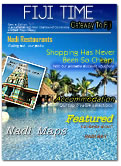Fijian Language
Common Words and Phrases
The Fijian language is not an easy one to come to grips with. One issue is the sheer number of dialects spoken, literally hundreds. However, there is no need
to be familar with these, the standard or official dialect is Bau, and is the most widely spoken.
Most tourists never get past words like Bula and Vinaka (hello and thank you), and there is no need to learn more, almost everyone in Fiji speaks English.
But for those that want to learn a few more phrases, then this page will help.
Fijian Alphabet and Pronunciation
The alphabet is the standard English one, except there is no
x or
z. There are a few "gotchas" though, which are...
- D is pronounced nd. Example: Nadi becomes Nandi
- C is pronounced th. Example: Colo becomes Tholo
- B is pronounced mb*. Example: Bure becomes mBure
- Q is pronounced ng. Example: Beqa becomes mBenga
* Don't get carried away with this one. Even locals don't always put the m in front of the b. So it's far more common to hear "Bula" than "mBula".
Note: Most websites give a literal translation of various Fijian words. We don't feel this is possible to do with any accuracy, so we have
tried to convery the meaning of the Fijian words/phrases, rather than give an exact intepretation.
Greetings, Salutations, Goodbyes etc.
Bula: (m-boola)Commonly used an informal greeting, like hi or hello. To add more respect or warmth to the greeting, add ni sa
at the start... ni sa bula.
Yadra: (yan-dra) Good morning. But it also means wake up, in the sense if somebody says something silly, you tell them to wake up, or Yadra!
Moce: (moth-ay) Goodbye. This can said more warmly or respectfully by adding ni sa... ni sa moce.
Sota Tale: (So-ta tar-lay) See you later, until next time.
Vinaka: Thank you. Vinaka vaka levu is thank you very much (levu means big or many, vaka means very or extremely)
OK, so that's the very basic bits that most tourists get to learn during their week or ten days in Fiji. Now for a few words/phrases
that you can use in everyday situations.
Io: (ee-oh) Yes
Sega: (sen-gar) No
Io beka: (ee-oh bekah) Maybe, possibly
Tulou: (too low) Excuse me. Although in Suva you will hear residents pronounce it as chillo.
Visoti au: (visoti ow) I'm sorry, or forgive me
Lako mai: (lak-oh my) Come here
Lako Tani: (lak-oh tarn-ay) Go away
You Are Here:
Home
Language





